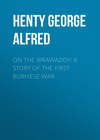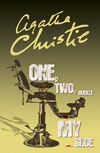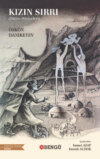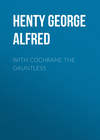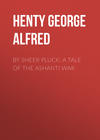Kitabı oku: «On the Irrawaddy: A Story of the First Burmese War», sayfa 9
Stanley had intended to pay a visit to the Larne; as Captain Marryat, who had dined at the staff mess on the previous evening, had invited him to go on board, whenever it might be convenient to him. The Larne had performed good service, in the operations against the stockades; and her boats had been particularly active and successful. Her captain was one of the most popular, as well as one of the most energetic officers in the service; and was to become as popular, with future generations, as the brightest of all writers of sea stories.
However, the day was not favourable for an excursion on the water. Stanley therefore went back to his room where, divesting himself of his jacket, he sat down at the open window, and read up a batch of the last newspapers, from England, that had been lent him by Colonel Adair.
At five o'clock Meinik came in, to say that his horse was at the general's door. Stanley hastily put on his jacket and cloak, and sallied out. The general came down in a few minutes, followed by Tollemache and, mounting, they rode to the pagoda.
Here Sir Archibald had a talk with the colonel of the 89th, and the officer commanding the battery of the Madras Artillery. Both were of opinion that their force was amply sufficient to resist any attack. The only approach to it from the forest was a long road between two swamps which, a short distance away, had become lakes since the wet weather set in.
"Had they taken us by surprise," the colonel said, "some of them might have got across, before we were quite ready for them, and might have given us some trouble but, as we shall be prepared, I don't think that any of them will reach the foot of this hill and, if they did, none of them would reach this terrace. If an attack were made from the other side, it would of course be a good deal more serious, as the ground is firm and they could attack all along the foot of the hill; but as they cannot get there, until they have defeated the rest of the army, I consider that, even without the assistance of the guns, we could hold the hill with musket and bayonet against any force that they are likely to bring against us."
"Very well, then; I shall not reinforce you, Colonel. Of course, we shall keep a considerable number of troops under arms, in case they should attack all along the line, at the same time that they make their principal effort here.
"I rather hope that the rain will keep on, until this affair is over."
The colonel looked surprised.
"I am much more afraid," the general went on, "of fire in the town, than I am of an attack without. The number of natives there is constantly increasing. No doubt the greater number of those who come in are natives of the place, who have managed, since we cleared out their war galleys from some of the creeks and channels, to escape from the authorities and to make their way in, either on foot or in fishermen's boats; but some of them may be sent in as spies, or to do us harm. I have been having a long talk over it with Colonel Adair, this afternoon, and he quite agrees with me that we must reckon on the probability of an attempt to fire the town. It would be a terrible blow to us if they succeeded, for the loss of our stores would completely cripple us. They would naturally choose the occasion of an attack upon our lines for the attempt for, in the first place, most of the troops will be under arms and drawn up outside the town; and in the second place the sight of the place on fire would cause much confusion, would inspirit our assailants, and necessitate a considerable force being withdrawn from the field, to fight the fire.
"If the rains continue we need feel no uneasiness, whatever, for there would be no getting anything to burn; whereas in dry weather, a man with a torch might light the thatch as fast as he could run along, and a whole street would be in a blaze in two or three minutes and, if a wind happened to be blowing, it might make a sweep of the whole place, in spite of all our efforts."
"I see that, sir. I own that I had never given it a thought, before."
"I shall come up here, Colonel, unless we obtain sure news, before the time arrives, that the attack is going to be a general one; indeed, it is in any case the best place to post myself, for I can see over the whole country, and send orders to any point where the enemy may be making progress, or where our men can advance with advantage. The line of fire flashes will be as good a guide, at night, as the smoke by day."
"I will get a cot rigged up for you, General, as we don't know which night it is to be."
"Thank you. Yes, I may just as well turn in, all standing, as the sailors say, and get a few hours' sleep; for in this climate one cannot keep at it, night and day, as we had to do in Spain."
The two aides-de-camp were kept in suspense as to what the general's intentions were, and it was not until the morning of Tuesday that he said to them:
"I am going up to the pagoda this evening, Mr. Tollemache; and you had better, therefore, put some provisions and a bottle of brandy into your holsters."
At nine in the evening they rode off. The rain had ceased; the moon was shining through the clouds.
"It will be down by twelve o'clock," Tollemache said. "I should think, most likely, they will wait for that. They will think that we shall not be able to take aim at them, in the darkness; and that they will manage to get to the foot of the hill, without loss."
When they reached the platform in front of the pagoda, their syces took their horses. Meinik had begged Stanley to let him take his groom's place on this occasion and, laying aside the dress he ordinarily wore, assumed the light attire of an Indian syce, and had run behind the horses with the others. He had a strong desire to see the fighting, but his principal motive in asking to be allowed to accompany Stanley was that, although greatly impressed with what he had seen of the drill and discipline of the white and native regiments, he could not shake off his faith in the Invulnerables; and had a conviction that the pagoda would be captured, and therefore wished to be at hand, to bring up Stanley's horse at the critical moment, and to aid him to escape from the assailants.
Fires were burning, as usual, at several points on the terrace. Two companies were under arms, and were standing well back from the edge of the platform, so as to be out of sight of those in the forest. The rest of the men were sitting round the fires. Their muskets were piled in lines hard by.
When he alighted, the general proceeded to the battery.
"Have you everything in readiness, Major?" he asked the officer in command.
"Yes, sir. The guns are all loaded with grape and, as it will be very dark when the moon has set, I have pegged a white tape along, just under each gun; so that they can be trained upon the causeway, however dark it may be."
"That is a very good idea," the general said. "There is nothing more difficult than laying guns accurately in the dark."
The colonel now arrived, a soldier having brought the news to him, as soon as the general reached the platform.
"I see that you are well prepared to give them a hot reception, Colonel."
"I hope so, sir. I have a strong patrol out beyond the causeway. My orders are that they are to resist strongly, for a minute or two, so as to give us time to have the whole of our force in readiness here. Then they are to retreat at the double to the foot of the hill; and then to open fire again, so that we may know that they are out of the way, and that we can begin when we like. We have been making some port fires this afternoon, and I have a dozen men halfway down the hill and, directly the outposts are safely across, they are to light the port fires, which will enable us to take aim. These white tapes will be guide enough for the artillery; but my men would make very poor shooting, if they could not make out the muzzles of their guns. Anyhow, I don't think that it is likely that the enemy will get across the causeway, however numerous they may be."
"I don't think they will, Colonel. Certainly, so far, they have shown themselves contemptible in attack; and have never made a successful stand, even for a minute, when we once entered their stockades, though they defend them pluckily enough until we have once got a footing inside.
"Still, these fellows ought to fight well tonight for, if they are beaten, it will be a death blow to their reputation among their countrymen. Besides, many of them do believe in the power they claim and, as we have found before now, in India, fanatics are always formidable."
After taking a look round with the colonel, the general accompanied him to his quarters; while the two aides-de-camp remained on the terrace, chatting with the officers; and then, after a time, went with some of them to the mess tent, where they sat smoking and talking until midnight, when all went out.
The troops were formed up under arms, and all listened impatiently for something that would show that the long-delayed assault would take place that night. At half-past twelve there was the sound of a shot, which sent an electrical thrill through the troops. It was followed almost immediately by others. The troops were at once marched forward to the edge of the platform. A babel of wild shouts went up at the sound of the first shots, followed by a burst of firing.
The two aides-de-camp had taken their places close to the general, who was standing in the gap between the infantry and the guns; and was looking intently, through his night glasses, at the forest.
"They are in a dense mass," he said. "I cannot see whether they are in any regular order, but they are certainly packed a great deal closer than I have ever before seen them. Those in front have got lanterns. They are coming along fast."
As yet the enemy were half a mile away, but the lanterns and the flash of their guns showed their exact position, while the fire of the outposts was kept up steadily. As the latter fell back along the causeway, the interval between the two forces decreased; and then the fire of the outposts ceased as, in accordance with their orders, they broke into the double.

The uproar of the advancing crowd was prodigious. Every man was yelling, at the top of his voice, imprecations upon the defenders of the pagoda; who were standing in absolute silence, waiting eagerly for the word of command. Suddenly the firing broke out again at the foot of the hill and, immediately, a bright light shot up from its face.
The edge of the dense mass of Burmese was now but some fifty yards from the wall that surrounded the foot of the hill, and the causeway behind was occupied by a solid mass of men. Then came the sharp order to the artillerymen, and gun after gun poured its charge of grape into the crowd while, at the same moment, the infantry began to fire, by companies, in steady volleys. For an instant the din of the assailants was silenced, then their shouts rose again and, after a moment's hesitation, they continued their advance.
But not for long. None but the most disciplined soldiers could have advanced under that storm of grape and bullets and, in ten minutes, they fled in wild confusion, leaving the causeway thickly covered with the dead. Again and again the British cheers rose, loud and triumphant; then the infantry were told to fall out, but the guns continued their fire, until the fugitives were well in the forest.
Between the shots the general listened attentively, and examined the country towards the town through his glasses.
"Everything is quiet," he said. "It is probable that, if those fellows had carried the hill, they would have made a signal, and there might have been a general attack. As it is, the affair is over for the night; and the Invulnerables will have some difficulty in accounting for their failure, and loss.
"Now, gentlemen, we may as well have up the horses, and ride back. We hardly expected to get away as soon as this."
"Well, Meinik, what do you think of your Invulnerables, now?" Stanley said, as the Burman, after picketing his horse, came up to his room to see if he wanted anything, before lying down on his bed in the passage.
"I don't know," the Burman replied, gravely. "They may be holy men; and proof, perhaps, against native weapons; but they are no good against your cannon and muskets. I understand, now, how it is that you beat us so easily. Your men all stood quiet, and in order; one only heard the voices of the officers, and the crash as they fired together.
"Then, your guns are terrible. I have seen ours firing but, though our pieces are smaller than yours, your men fire five shots to our one. I stood by while they were loading. It was wonderful. Nobody talked, and nobody gave orders. Each man knew what he had to do–one did something and, directly, another did something and, almost before the smoke of the last shot was out of the gun, it was ready to be fired again.
"It is clear to me that we have not learnt how to fight, and that your way of having only a few men, well taught and knowing exactly what they have to do, is better than ours of having great numbers, and letting everyone fight as he pleases. It is bad, every way. The brave men get to the front, and are killed; and then the others run away.
"You were right. We shall never turn you out of Rangoon, till Bandoola comes. He has all our best troops with him, and he has never been beaten. All the troops know him, and will fight for him as they will not fight for these princes–who know nothing of war, and are chosen only because they are the king's brothers. When he comes, you will see."
"No doubt we shall, Meinik; and you will see that, although they may make a better fight of it than they have done tonight, it will be just the same, in the end."
For the next two months the time passed slowly. No attacks were made by the enemy, after the defeat of the assault upon the pagoda. Peasants and deserters who came in reported that there was profound depression among the Burmese troops. Great numbers had left the colours, and there was no talk of another attack.
The troops being, therefore, relieved of much of their arduous night duty, the English took the offensive. The stockades on the Dalla river, and those upon the Panlang branch–the principal passage into the main stream of the Irrawaddy–were attacked and carried, the enemy suffering heavily, and many pieces of artillery being captured.
The rains continued almost unceasingly, and the troops suffered terribly in health. Scarce three thousand remained fit for duty, and the greater portion of these were so emaciated and exhausted, by the effects of the climate, that they were altogether unfit for active operations.
Three weeks after the fight at the pagoda a vessel came up the river, with a letter from the officer in command of the troops assembled to bar the advance of Bandoola against Chittagong, saying that the Burmese army had mysteriously disappeared. It had gone off at night, so quietly and silently that our outposts, which were but a short distance from it, heard no sign or movement, whatever. The Burmese had taken with them their sick, tents, and stores; and nothing but a large quantity of grain had been found in their deserted stockades.
The news was received with satisfaction by the troops. There was little doubt that the court of Ava–finding that their generals had all failed in making the slightest impression upon our lines, and had lost vast numbers of men–had at last turned to the leader who had conquered province after province for it, and had sent him orders to march, with his whole army, to bring the struggle to a close. The soldiers rejoiced at the thought that they were at last to meet a real Burmese army. Hitherto they had generally stood on the defensive, and had to fight the climate rather than the foe; and it seemed to them that the campaign was likely to be interminable.
The march of the Burmese from Ramoo to Sembeughewn, the nearest point of the river to the former town, must have been a terrible one. The distance was over two hundred miles, the rains were ceaseless, and the country covered with jungles and marshes, and intersected by rivers. No other army could have accomplished such a feat. The Burmans, however, accustomed to the unhealthy climate, lightly clad, and carrying no weight save their arms and sixteen days' supply of rice, passed rapidly over it.
Every man was accustomed to the use of an axe and to the formation of rafts and, in an incredibly short time, rivers were crossed, deep swamps traversed on roads made by closely-packed faggots and, but a few days after hearing that Bandoola had started, the general learned, from peasants, that the news had come down that he and a portion of his army had arrived at Sembeughewn.
Almost at the same time, other parties who travelled down along the coast reached Donabew, a town on the Irrawaddy, some forty miles in direct line from Rangoon. This had been named as the rendezvous of the new army, and to this a considerable proportion of Bandoola's force made their way direct from Ramoo; it being the custom of the Burmese to move, when on a march through a country where no opposition was to be looked for, in separate detachments, each under its own leader, choosing its own way, and making for a general rendezvous. Travelling in this manner, they performed the journey far more rapidly than they could have done moving in one body, and could better find shelter and food.
Other forces from Prome, Tannoo, and other quarters were known to be marching towards Donabew. It was soon reported that the dejected forces around Rangoon had gained courage and confidence, at the news that Bandoola and his army were coming to their aid, and that the deserters were returning in large numbers from their villages. The British sick were sent away in the shipping to Mergy and Tavoy, two coast towns of which we had taken possession, and both of which were healthily situated.
The change had a marvellous effect, and men who would have speedily succumbed to the poisonous exhalations of the swamps round Rangoon rapidly regained their strength, in their new quarters.
Chapter 9: Victories
In the meantime, negotiations had been going on with Siam, between which state and Burma there was the bitterest enmity. It had been thought that Siam would have willingly grasped the opportunity to revenge itself for the many losses of territory that it had suffered at the hands of Burma. This there was no doubt that it would have been glad to do, but our occupation of several points on the coast of Tenasserim roused the fears of Siam, and inclined it to the belief that we might prove an even more dangerous neighbour than Burma.
The court of Ava had, on its part, also sent urgent messages to the King of Siam–when misfortunes had, to some extent, lowered its pride–calling upon him to make common cause with Burma, and to join it in repelling an enemy who would doubtless be as dangerous to him as to Burma.
Siam, however, determined to steer a middle course. An army was assembled, in readiness for any contingency; but Siam believed as little as Burma, itself, that the British could possibly be victorious over that power; and feared its vengeance, if she were to ally herself with us while, upon the other hand, Siam had a long sea coast, and feared the injury our fleet might inflict upon it, were it to join Burma. The king, therefore, gave both powers an assurance of his friendship; and marched his army down to the frontier of the province of Martaban, which bordered on the great Salween river on the Tenasserim coast, and lay some two hundred miles from Rangoon, across the gulf of Martaban.
The intentions of the king being so doubtful, the advance of the Siamese army in this direction could not be regarded with indifference by the British. The town of Martaban was the centre of the Burmese military power in Tenasserim, and the advance towards it of the Siamese army would place it in direct communication with that of Burma. On the 13th of October, therefore, a force, consisting of a wing of the 41st Regiment and the 3rd Madras Infantry, sailed from Rangoon against the town. The expedition was delayed by light winds and, when it arrived at the mouth of the river, found that every preparation had been made for an obstinate defence. They learned, from a peasant, that strong works had been erected on every eminence round the town; and that the road from the coast had been cut, and stockaded.
Approach by this route was impossible, for there were twenty miles of country to be traversed; and much of this was under water from the inundations. It was, therefore, determined to go up the river, although this was so shallow and full of shoals that the navigation was extremely difficult. At last, after great labour–incurred by the ships constantly getting ashore–they succeeded in making their way up to Martaban, and anchored off the town.
A heavy cannonade was carried on, for some time, between the ships and the enemy's works. Then the troops were embarked in boats, which rowed for the shore under a very heavy fire from the enemy. As soon as they landed, and advanced to attack the stockades, the Burmese lost heart and hastily retreated; while the inhabitants received the troops as they entered with the warmest welcome–for they were, for the most part, natives of Pegu, and still entertained a deep hatred for the Burmese, because of the long oppression that they had suffered at their hands.
Throughout the rest of Tenasserim, however; and indeed, throughout the whole country traversed by the troops later on, the inhabitants appeared to have entirely forgotten their ancient nationality, and the conquest of their country by the Burmans; and to have become completely absorbed by them. Throughout the whole time that we occupied Martaban, the people gave no trouble whatever and, indeed, offered to raise a force for service with us, if we wished it.
At the end of October the rain ceased–to the intense delight of the troops–and the cold season set in. November was, however, an exceptionally deadly month–the occasional days of fine weather drawing up the exhalations from the swamps–and the number of deaths was greater than they had been at any previous time. There was, too, no prospect of a forward movement, at present. The expedition had come unprovided with boats or other means of transport, making sure that an abundant supply would be obtained, in a country where the whole trade was carried on by the rivers. The promptness with which the native authorities had, on the first appearance of the fleet, sent every boat away, had disappointed this anticipation and, although the opening of some of the other rivers had enabled the local fishermen to bring their boats to Rangoon, where fish were eagerly purchased, the British troops were still, up to the end of November, without the means of sending a hundred men up the river, save in the boats of the fleet.
The Indian authorities–believing that, when the Burmese found themselves impotent to turn us out of Rangoon, the court of Ava would be glad to negotiate–had not, until the autumn was drawing to a close, thought of making any preparations to supply the army with water carriage. They now, however, began to bestir themselves. Five hundred boatmen were sent from Chittagong, bringing many boats down with them, and building others at Rangoon. Transports with draft cattle sailed from Bengal, and a considerable reinforcement of troops was on its way to join, at the end of December–for all the natives agreed that no movement could be made, by land, until the end of January.
In November, even Bandoola's army was obliged to make its approach by water. Early in that month it was learned that the Burmese general had given orders for the advance, and preparations were at once begun to meet what none doubted would be a very serious attack. The reinforcements had not yet arrived, and the greatly diminished force was far too small for the length of the line that had to be defended. Redoubts were therefore thrown up, pagodas and other buildings were fortified; and two complete lines of works constructed, from the great pagoda to the city, one facing east and the other west.
The post at Kemmendine was strengthened, and was supported by H. M. sloop Sophie, a company's cruiser, and a strong division of gunboats. The retention of this post was of great importance, as it barred the river approach to Rangoon, and prevented the enemy sending down a huge fleet of war galleys and fire rafts to attack the town, and set fire to the merchant shipping lying off it.
In the last week of November, smoke was seen to rise from many points in the forest. Many fugitives came in from their villages, and reported that Bandoola's army were all on their way down the river; and by the end of the month some sixty thousand men, with a large train of artillery and a body of cavalry, were assembled round our position. Of this force, thirty thousand were armed with muskets. They had with them, too, a great number of jingals. These little guns carried ball of from six to twelve ounces, and were mounted on a light carriage, which two men could wheel with ease. The cannon were carried to the scene of action on elephants. The cavalry were seven hundred strong, drawn from the borders of Manipur.
The rest of the army were armed with swords and spears, and carried implements for stockading and entrenching. The force was accompanied by a number of astrologers; and by the Invulnerables–who had, doubtless, satisfactorily explained their failure to capture the pagoda.
A great semicircle of light smoke, rising from the trees, showed that the position taken up by Bandoola extended from the river above Kemmendine to the neighbourhood of Rangoon. On the night of the 31st, the troops at the pagoda heard a loud and continuous stir in the forest. It gradually approached and, by morning, great masses of troops had gathered at the edge of the jungle, within musket shot of the post. The garrison there were drawn up in readiness to repel a sudden rush but, just as the sun rose, a din made by thousands of men engaged in cutting down the trees began, and it was evident that the Burmese were going to adopt their usual plan of entrenching themselves behind stockades.
During the time that had elapsed between the repulse of the Invulnerables and the arrival of Bandoola's army, Stanley's work was light, and the life dull and monotonous. An hour was spent, every morning, in examining the fugitives who had, by the retreat of the Burmese, been enabled to make their way back to the town; and of women who had escaped from the vigilance of the Burmese police, and had come in from the villages where they had been held as hostages for their husbands. Once or twice a week, he went off with the general to the hospital ship, to inquire into the state of the sick and to pay a visit to the long line of cots along the main and lower deck. Almost every day he rode, in spite of the weather, to one or other of the regimental camps; and soon came to know most of the officers of the force. His previous experience on the rivers had done much to acclimatise him, and his health continued good.
On the evening of the 30th he had, at the general's order, ridden up to the pagoda. It was considered likely that the attack would be delivered there in the first place and, at three o'clock in the morning, when it became evident that a large body of men were approaching through the forest, he galloped back to Rangoon with the news and, at five, rode out again with Sir A. Campbell.
Among the garrison there was much disappointment when the sound of wood chopping announced that the Burmese did not intend to attack; but the general, who had been watching the edge of the jungle through his glasses, lowered them and put them into their case with an expression of satisfaction.
"I don't want them to attack, Colonel," he said. "If they do, and we beat them off, we are no nearer the end than before. That sort of thing might be carried on for months; as long, in fact, as there remains a man to bring up. What we want is to inflict such a heavy blow upon them, that even the court at Ava may become convinced that they cannot hope to drive us out of Rangoon; in which case they may consent to negotiate, and we may bring the war to an end.
"Heaven knows that we have suffered enough loss, at present; and I don't want to have to undertake such a difficult operation as an advance against Ava. I am glad to see that they have begun to construct stockades. I do not intend to interfere until they have completely finished their work, and gained sufficient confidence to make a general attack on us. Then we shall be able to give them a heavy lesson.
"Ah, there they are, at work!"
As he spoke, a roar of musketry and artillery broke out suddenly from Kemmendine, and all eyes were turned in that direction. The spot was two miles distant, but the forest shut out, alike, the view of the river and of the works held by us. The exact position, however, was indicated by the masts of the two war vessels, rising above the trees.
Soon great wreaths of heavy white smoke rose above the forest, in and around Kemmendine, shutting out all view. The fire continued without abatement, and it was evident that the attack was a hot and determined one. Confident as all felt that the little fort would be able to defend itself successfully, the great smoke clouds were watched with some feeling of anxiety; for the garrison was, after all, but a handful. In momentary intervals of the firing, the yells and shouts of the natives could be distinctly heard and, once or twice, after a heavy broadside from the ships of war, the cheers of the British sailors could be plainly recognized.
After two hours' fighting the din gradually ceased. The clouds of smoke rolled away, and the masts of the ships became visible, and the garrison of the pagoda raised three hearty cheers, to tell the defenders that their successful defence had been watched and welcomed.
